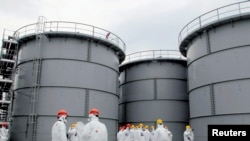BANGKOK —
Japan's government says it will take the lead in trying to stem the leaks of highly radioactive water at the Fukushima nuclear power plant. The nuclear reactors were crippled by a huge tsunami generated by a devastating earthquake two and a half years ago.
Japanese Prime Minister Shinzo Abe is vowing to spend whatever is needed to contain the ongoing disaster at the destroyed Fukushima reactors on the Pacific coast in the northeastern part of the country.
Abe took steps on Tuesday after repeated leaks of highly toxic water at the site indicated that the plant's operator has not been able to sufficiently manage the cleanup.
The Japanese prime minister said it can no longer be left to Tokyo Electric Power Company (TEPCO) to handle the problems resulting from the contaminated water leaks.
“Instead of the ad hoc approaches that have been taken in the past, we put together a basic policy today that will offer a fundamental solution to the problem of contaminated water," he said. "The government needs to resolve the problem by standing at the forefront.”
One of the government responses will be the construction of a shielding wall of frozen earth around the reactors to prevent contaminated water coming into contact with groundwater.
Japan's nuclear regulator is expressing concern about the stability of the destroyed power plant amid revelations of freshly discovered water leaks.
The initial amount of public funds pledged by the government for the cleanup equals $470 million.
Kevin Maher, a former U.S. diplomat who ran the State Department's task force on the March, 2011 disaster, tells VOA that Japanese government financing is essential for the cleanup.
"There's no way that a company like TEPCO for the industry as a whole can survive with the tremendous liabilities that they're facing. I've seen estimates anywhere from a total of all those combined of 13, 14, 15 trillion yen -- up to $150 billion," he said. "$400 million or so additional money is essential but it's not going to solve the problem. Hopefully it's going to be the first step of the government taking a more active role in managing the process, not just providing money to TEPCO."
Maher, now a senior advisor at NMV Consulting in Washington, says the entities currently leading the cleanup have no experience with decontaminating and decommissioning nuclear facilities.
"They need to have a program manager reporting to the government. And that program manager needs to have the authority to make very difficult decisions and make those decisions in terms of what's most efficient, cost effective and safest and quickest way to clean this facility up," he said.
Japanese officials contend that the water leaks at the coastal facility do not pose a threat to any other countries because the radiation will be diluted in the Pacific Ocean. But the closest towns to the plant, abandoned since the accident, are not likely to be re-inhabited for many years to come.
Japanese Prime Minister Shinzo Abe is vowing to spend whatever is needed to contain the ongoing disaster at the destroyed Fukushima reactors on the Pacific coast in the northeastern part of the country.
Abe took steps on Tuesday after repeated leaks of highly toxic water at the site indicated that the plant's operator has not been able to sufficiently manage the cleanup.
The Japanese prime minister said it can no longer be left to Tokyo Electric Power Company (TEPCO) to handle the problems resulting from the contaminated water leaks.
“Instead of the ad hoc approaches that have been taken in the past, we put together a basic policy today that will offer a fundamental solution to the problem of contaminated water," he said. "The government needs to resolve the problem by standing at the forefront.”
One of the government responses will be the construction of a shielding wall of frozen earth around the reactors to prevent contaminated water coming into contact with groundwater.
Japan's nuclear regulator is expressing concern about the stability of the destroyed power plant amid revelations of freshly discovered water leaks.
The initial amount of public funds pledged by the government for the cleanup equals $470 million.
Kevin Maher, a former U.S. diplomat who ran the State Department's task force on the March, 2011 disaster, tells VOA that Japanese government financing is essential for the cleanup.
"There's no way that a company like TEPCO for the industry as a whole can survive with the tremendous liabilities that they're facing. I've seen estimates anywhere from a total of all those combined of 13, 14, 15 trillion yen -- up to $150 billion," he said. "$400 million or so additional money is essential but it's not going to solve the problem. Hopefully it's going to be the first step of the government taking a more active role in managing the process, not just providing money to TEPCO."
Maher, now a senior advisor at NMV Consulting in Washington, says the entities currently leading the cleanup have no experience with decontaminating and decommissioning nuclear facilities.
"They need to have a program manager reporting to the government. And that program manager needs to have the authority to make very difficult decisions and make those decisions in terms of what's most efficient, cost effective and safest and quickest way to clean this facility up," he said.
Japanese officials contend that the water leaks at the coastal facility do not pose a threat to any other countries because the radiation will be diluted in the Pacific Ocean. But the closest towns to the plant, abandoned since the accident, are not likely to be re-inhabited for many years to come.







